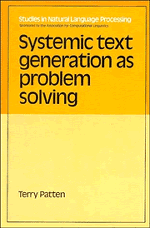Book contents
- Frontmatter
- Contents
- Dedication
- Preface
- 1 Introduction
- 2 Background I: AI problem solving
- 3 Background II: systemic grammar
- 4 The conflation
- 5 The formal model
- 6 The implementation
- 7 Related work in text generation
- 8 Conclusions
- Appendix A OPS5 tutorial
- Appendix B Sample texts
- Appendix C Excerpts from the grammar
- Notes
- Bibliography
- Index
- Frontmatter
- Contents
- Dedication
- Preface
- 1 Introduction
- 2 Background I: AI problem solving
- 3 Background II: systemic grammar
- 4 The conflation
- 5 The formal model
- 6 The implementation
- 7 Related work in text generation
- 8 Conclusions
- Appendix A OPS5 tutorial
- Appendix B Sample texts
- Appendix C Excerpts from the grammar
- Notes
- Bibliography
- Index
Summary
The research reported here was done within the Department of Artificial Intelligence at the University of Edinburgh. All the chapters but one are, with some modifications, chapters from my doctoral thesis. The exception (Chapter 5), is a slightly revised version of a paper written jointly with Graeme Ritchie, that was presented at the Third International Workshop on Natural Language Generation.
I would like to thank my thesis supervisor, Graeme Ritchie, for his patient and constructive criticism throughout the development of this work, and of course, for his direct contribution to Chapter 5. My other supervisor, Austin Tate, and the rest of the Edinburgh planning group provided insights into AI problem solving. I would also like to thank my thesis examiners, C. S. Mellish and Henry Thompson, for their helpful suggestions. I am also grateful to Mark Drummond, Andy Golding and Chris Sothcott for valuable technical discussions, to Mark Kingwell for proof-reading the thesis draft, and to Aravind Joshi as editor of the Cambridge University Press Studies in Natural Language Processing series.
This research was supported in part by Alberta and Canada Student Loans, and an Overseas Research Student Award. The word-processing and typesetting facilities used in the preparation of the final draft were kindly provided by the Department of Computer Science at the University of Calgary.
- Type
- Chapter
- Information
- Publisher: Cambridge University PressPrint publication year: 1988



